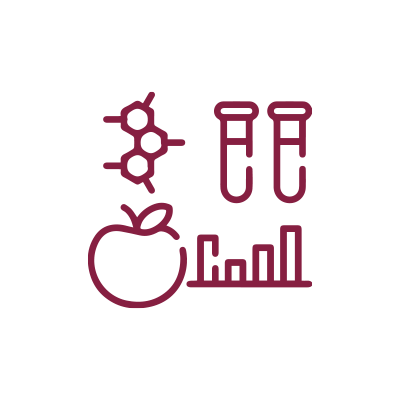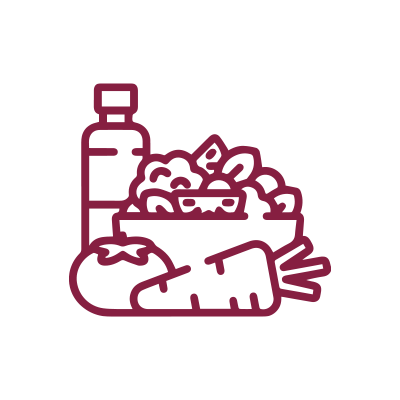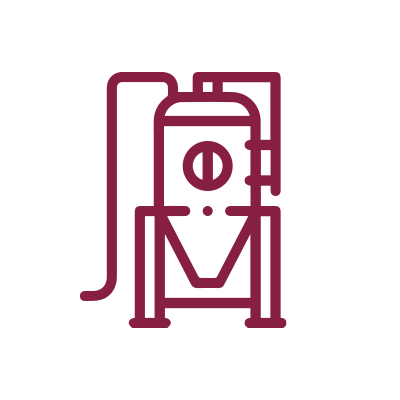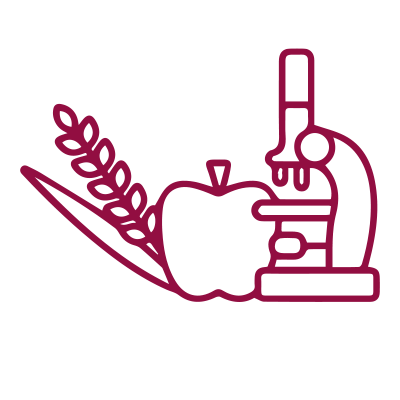Undergraduate

Our Undergraduate Degree was
RANKED NINTH BEST NATIONALLY
by Successful Student
What is Food Science?
Food Science and Technology utilizes the combined disciplines of engineering, biology, chemistry, microbiology, mathematics, physics, and biochemistry in an effort to improve the safety, health, preservation quality, and availability of the local and global food supply in order to help better feed the world.
Why get a B.S. in Food Science?
The Food Science and Technology major offers students the opportunity to use science in exciting and innovative ways, with a focus on experiential learning. Depending on the degree option they choose, students might develop and test new food products, study the pathogens that cause foodborne illness, or learn the art of brewing beer or winemaking.

Fast Facts

Nearly 100% of Virginia Tech's food science and technology graduates have jobs in product development, research, sales and marketing, quality assurance, production management, analytical and technical services, and regulatory affairs at graduation.

Food processing is the largest industry in the United States. This industry employs nearly 2 million people and accounts for more than 16 percent of the country's gross national product.

In a recent survey of U.S. food science programs, Virginia Tech ranked 6th nationally in placing food science B.S. graduates into graduate or professional schools.

The department is approved by the national Institute of Food Technologists.

In 2017, the department's Brewing and Fermentation degree option became one of only a handful of four-year programs to be recognized by the Master Brewers Association of the Americas.

FST is a Naval ROTC approved program! Naval ROTC undergraduates who select food science and technology as their major can get full ROTC scholarships.

FST 2004 - Exploring Food Science Careers
1 credit
Get a hands-on introduction to the wide range of specialization areas and food science careers that will be available to you. Through the Virginia Tech Bridge Experience Program, you will get a crash course in research, internship, study abroad, career preparation, job search strategies, and more.

FST 4534 - Food Chemistry Lab
1 credit
Put into practice your knowledge of food chemistry — the study of chemical processes and interactions of the components of foods. Investigate the functional properties of proteins, carbohydrates, and lipids in processed foods, including the effect of environmental conditions, solubility, carbohydrate crystallization, and lipid absorption.
FST 3514 - Food Analysis
4 credits
Learn the theory and practice of chemical and physical methods of food analysis to determine food composition. You’ll cover data analysis, sampling techniques, and how to apply analytical methods of quality control and food laws and regulations.

FST 3604 - Food Microbiology
4 credits
The study of microorganisms in foodborne illness, food quality, spoilage, and preservation. You’ll learn about the control of microorganisms in foods and various methods to identify, catalog, and characterize them.

FST 4314 - Food Processing Lab
1 credit
Get an introduction to the basic principles of unit operations, or the individual tasks involved in the processing of a given food. You’ll cover heat and mass transfer, raw food materials and packaging, commercial food processing equipment, and the various processing methods used to ensure food safety and quality.

FST 4014 - Concepts of Food Product Development
3 credits
Develop your own food product! You’ll learn the standard practices of research and product development as they’re applied in the food industry, including the functionality of ingredients and market research, and then team up with other students to apply what you’ve learned to develop a brand new food product.
Options for Food Science Majors
The objective of the program is to develop within students an understanding of the nature, properties, and characteristics of foods as determined through biochemistry, chemistry, microbiology, physics, and other sciences, thus the program offers three degree options for undergraduate students.
Options

Science Option
In addition to the core food science elements, this option will give you an understanding of the principles of sensory science, food analysis, statistics, and food product development. Graduates in this area usually go on to careers in processing, packaging, quality assurance, quality control, education, government, or extension in addition to being well prepared for graduate school.

Food Business Option
Choose this option and you'll take business courses including accounting, finance, management, marketing, business information technology, and economics. Graduates are prepared for careers in management, technical sales, service, and marketing.

Food and Health Option
Learn the science behind fermented foods and beverages and their significant contribution to food processing and preservation and the human microbiome. The skills learned will prepare you for satisfying careers in the rapidly growing area of healthy fermented foods in addition to the beer, wine, cheese, and chocolate industries.
Minors in Food Science
The department offers two options for those outside the food science major who would like to supplement their education with food science skills and experience. Students can choose between a food science minor and a minor in fermentation. To apply, go to CALS Student Forms and click on "Add or Drop Minor in CALS." FST students may participate in the Cooperative Education & Internship Program.
Minors
Food Science and Technology
A well-rounded exploration of the core tenets of food science. Through a combination of classroom and experiential learning, students will discover the elemental scientific principles utilized in this wide-ranging field, from microbiology to process engineering to quality assurance to chemistry.
Prerequisites
- BIOL 2604/2614 - Gen Microbiology/Lab (pre: BIOL 1105, 1106, CHEM 1035, 1045)
- BCHM 2024 - Concepts of Biochem, will accept BCHM 3114 or 4115 (pre: CHEM 2514 or 2535)
Required Courses
- FST/BIOL 3604 - Food Microbiology and Lab
- FST 4304 - Food Processing or BSE 4604 - Food Process Engineering
- FST 4314 - Food Processing Laboratory
- FST 4504 - Food Chemistry
- FST 4524 - Food Safety and Quality Assurance
Restricted Electives
4 credit hours (View course catalog listing for selections)
Total Credit Hours: 18

Fermentation
Study the ancient process of food and beverage fermentation through its biochemical, microbiological, and engineering fundamentals. Graduates with fermentation expertise are highly sought-after in a number of fields, including the food, beverage, pharmaceutical, and biofuel industries.
Prerequisites
- CHEM 1036 - General Chemistry (pre: CHEM 1035)
- BIOL 2604/2614 - General Microbiology/Lab (pre: BIOL 1105, 1106, CHEM 1036)
Required Courses
- FST 2424 - Intro to Food and Beverage Fermentation
- FST 3604 - Food Microbiology and Lab
- FST 4104 - Applied Brewing Science and Engineering
Restricted Electives
4 credit hours (View course catalog listing for selections)
Total Credit Hours: 19
Learning doesn't stop at lectures in classrooms. Whether you're diving deep into research, embarking on an exciting study abroad adventure, getting hands-on experience through internships, or teaming up with peers in student organizations, there are countless ways to expand your knowledge and skills. These real-world experiences not only enrich your education but also prepare you to make an impact in the ever-evolving world of food science.
-
General Item
-
General Item
-
General Item
-
Redirect Item
What our Food Science Graduates Do
A food scientist studies the physical, microbiological, and chemical makeup of food. Depending on the area of specialization, food scientists may develop ways to process, preserve, package, or store food, according to industry and government specifications and regulations. Food science and technology is the key to the conversion of raw agricultural materials into a wide variety of properly processed and preserved foods.

Career opportunities for food scientists include:
- Food safety
- Food quality control
- Food product development
- Manufacturing and production management
- Technical sales and service
- Ingredient management
- Research and development
- Inspection services with state or federal government
- Technical writing
- Teaching
- Consulting work
Students completing the science or food and health option requirements will also be prepared for graduate and professional schools of medicine, dentistry, and veterinary medicine.




%20(1).jpeg.transform/s-medium/image.jpeg)

.jpg.transform/s-medium/image.jpg)